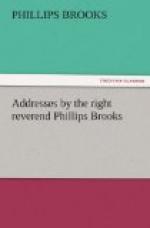It is the great boon of such characters as Mr. Lincoln’s, that they reunite what God has joined together and man has put asunder. In him was vindicated the greatness of real goodness and the goodness of real greatness. The twain were one flesh. Not one of all the multitudes who stood and looked up to him for direction with such a loving and implicit trust can tell you to-day whether the wise judgments that he gave came most from a strong head or a sound heart. If you ask them, they are puzzled. There are men as good as he, but they do bad things. There are men as intelligent as he, but they do foolish things. In him goodness and intelligence combined and made their best result of wisdom. For perfect truth consists not merely in the right constituents of character, but in their right and intimate conjunction. This union of the mental and moral into a life of admirable simplicity is what we most admire in children; but in them it is unsettled and unpractical. But when it is preserved into manhood, deepened into reliability and maturity, it is that glorified childlikeness, that high and reverend simplicity, which shames and baffles the most accomplished astuteness, and is chosen by God to fill his purposes when he needs a ruler for his people, of faithful and true heart, such as he had who was our President.
Another evident quality of such a character as this will be its freshness or newness; if we may so speak. Its freshness or readiness—call it what you will—its ability to take up new duties and do them in a new way, will result of necessity from its truth and clearness. The simple natures and forces will always be the most pliant ones. Water bends and shapes itself to any channel. Air folds and adapts itself to each new figure. They are the simplest and the most infinitely active things in nature. So this nature, in very virtue of its simplicity, must be also free, always fitting itself to each new need. It will always start from the most fundamental and eternal conditions, and work in the straightest even although they be the newest ways, to the present prescribed purpose. In one word, it must be broad and independent and radical. So that freedom and radicalness in the character of Abraham Lincoln were not separate qualities, but the necessary results of his simplicity and childlikeness and truth.
Here then we have some conception of the man. Out of this character came the life which we admire and the death which we lament to-day. He was called in that character to that life and death. It was just the nature, as you see, which a new nation such as ours ought to produce. All the conditions of his birth, his youth, his manhood, which made him what he was, were not irregular and exceptional, but were the normal conditions of a new and simple country. His pioneer home in Indiana was a type of the pioneer land in which he lived. If ever there was a man who was a part of the time and country he lived in,




